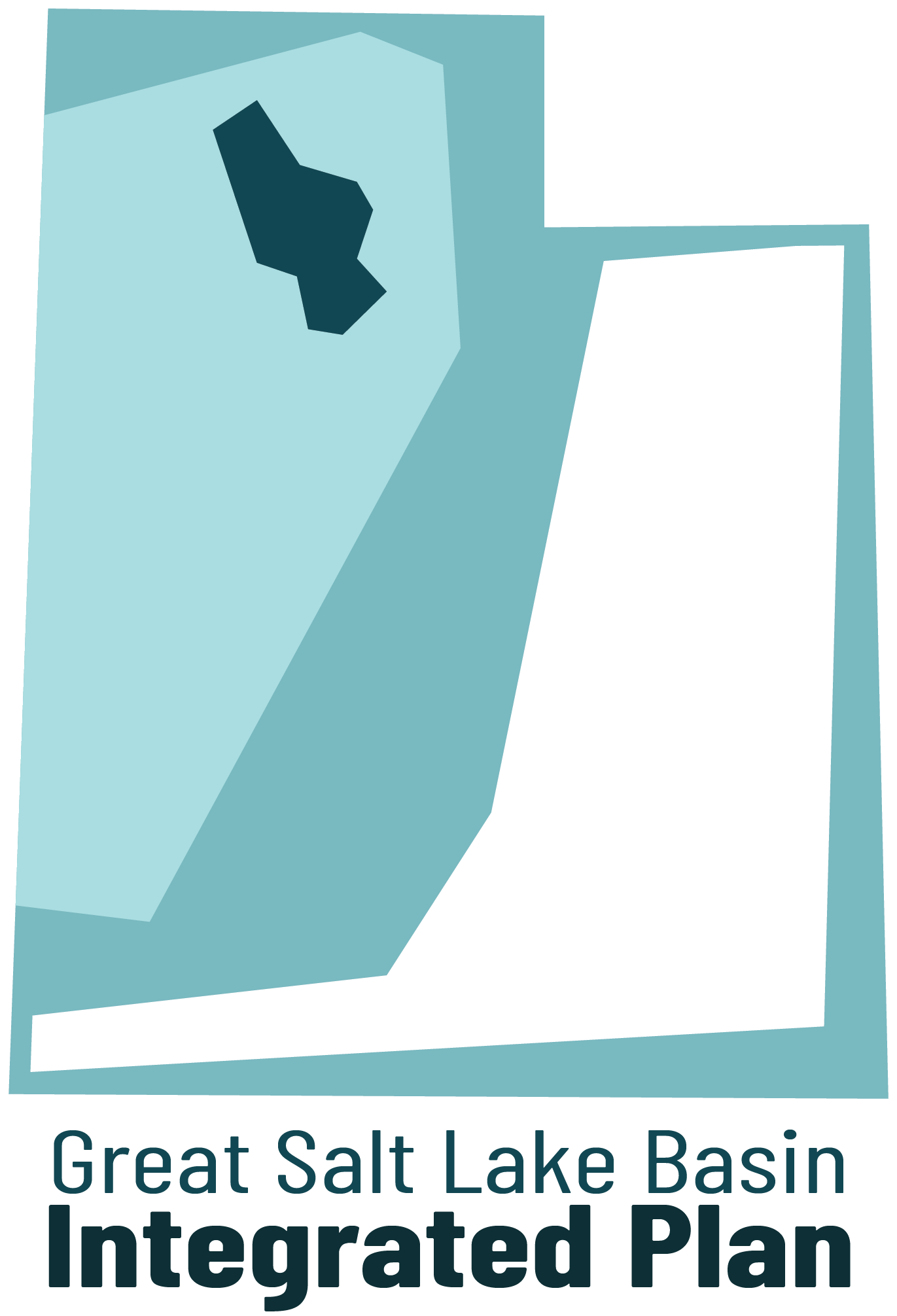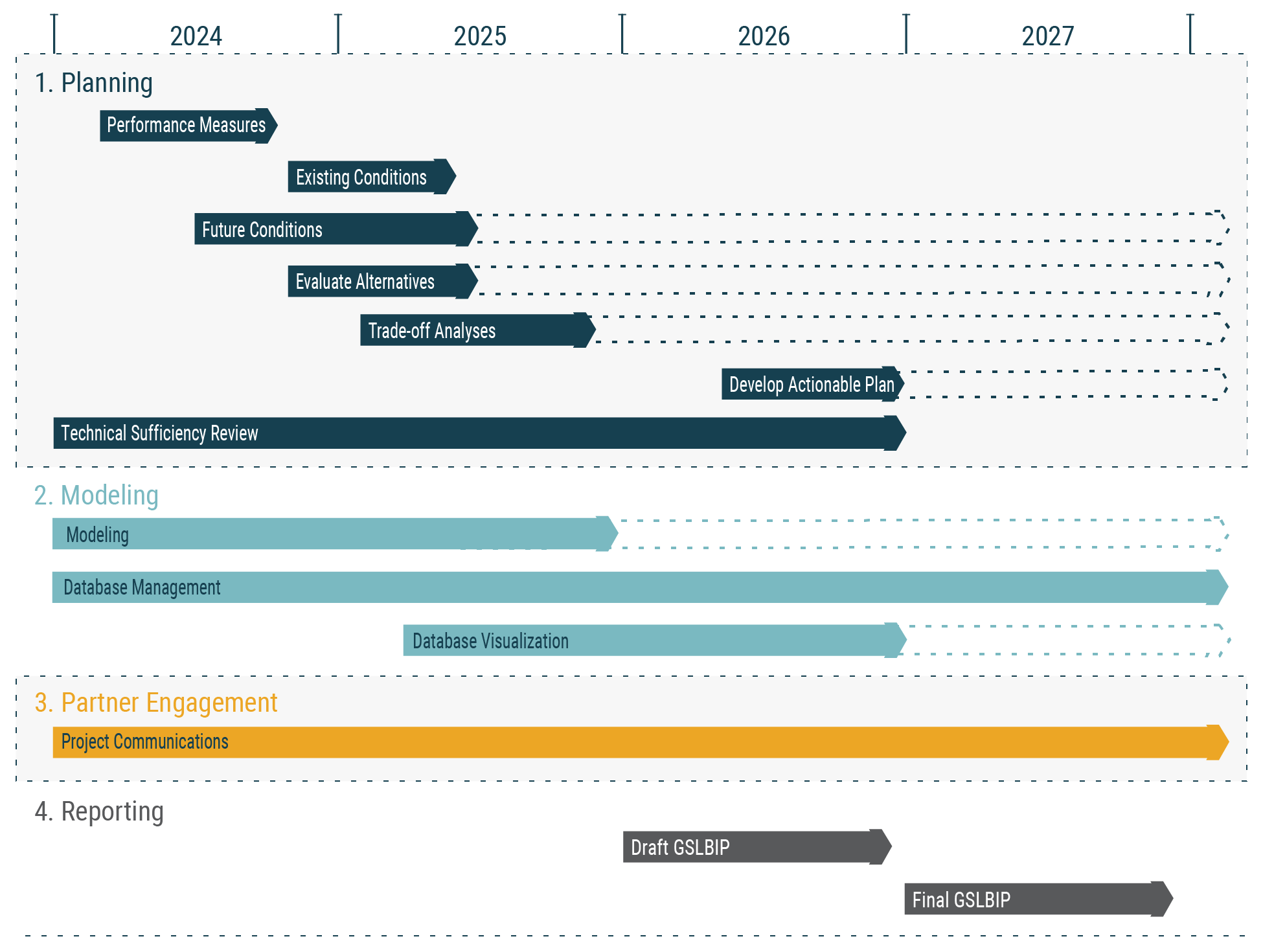
The objective of the Great Salt Lake Basin Integrated Plan is to ensure a resilient water supply for Great Salt Lake and all water uses, including people and the environment, throughout the watershed.
It will combine and enhance existing water resource management tools from across the basin in order to better understand current supply and demand. It will then collaboratively explore options to address water supply imbalances, increase supply reliability and avoid degradation of the vital Great Salt Lake ecosystem.
In addition, it will include a strategy trade-off analysis within each river basin to assess the costs and benefits of meeting different water resource related goals. All leading to a more holistic, informed approach to decision making and planning throughout the entire Great Salt Lake Basin.
To subscribe for GSLBIP updates, send an email with the subject line “Subscribe” to GSLBasinPlanning@utah.gov.
Phase One: The Work PlanCompleted in winter 2024, the Work Plan for the Great Salt Lake Basin Integrated Plan synthesizes information, literature and data across the watershed related to water quantity and quality, water use, water demand, surface and groundwater diversions, depletions and return flows. Work Plan & Appendices |
A virtual open house was held on December 7, 2023. This two-hour event included an informational session, panel discussion and follow-up Q & A. |
| Individual Sections | Appendices |
|
*If printing, select “Fit to Printable Area.” Some pages are oversized.
Phase Two: The Integrated Plan
The Work Plan provides a road map for the completion of the Great Salt Lake Basin Integrated Plan. The Work Plan lays out an integrated collaborative approach to making decisions through hydrodynamic modeling, scenario planning and strategic research. Importantly, the Great Salt Lake Basin Integrated Plan must integrate ongoing efforts and systems, develop meaningful solutions and recommend actions that shape a lasting water legacy for future generations.

GSLBIP Goal:
Ensure a resilient water supply for Great Salt Lake and all water uses, including people and the environment, throughout the watershed.
GSLBIP Objectives:
- Forge connections
- Develop a shared understanding
- Quantify water resources
- Evaluate options
- Recommend actions
GSLBIP Studies:
Appendix J of the Work Plan identified many critical studies that will support development of the final integrated plan and build foundations for future water management decision making. The status and links to the studies, as they are complete, are listed below.
Study | Status | Estimated Completion | Resources |
Great Salt Lake Stormwater Study | Complete | November 2023 | |
Opportunities and Costs of M&I Water Conservation | Complete | September 2025 | |
Options and Costs for Dust Control | Complete | February 2026 | |
Opportunities and Costs for Agricultural Optimization and Leasing | In progress | February 2026 | |
Functional Flows for Streams | In progress | June 2026 | |
Quantification of Evaporative Losses from Great Salt Lake and its Wetlands | In progress | June 2026 | |
Groundwater Well Monitoring | In progress | June 2027 | |
Bioenergetics Study: Water Requirements for Shorebirds | In progress | June 2027 |
Background
Water levels in Great Salt Lake – the largest saline lake in the Western Hemisphere – are in decline, posing significant consequences for the environment, ecology and economy. In recent years the state has implemented numerous changes to water law and policy, conducted invaluable research, and established several programs intended to bring water to Great Salt Lake. Several initiatives aimed at getting water to Great Salt Lake have called for an integrated water resource assessment and planning tool that will help the state better understand the water supply and demand in the Great Salt Lake Basin. These initiatives include HCR 10 “Concurrent Resolution to Address Declining Water Levels of the Great Salt Lake,” Water Strategies For Great Salt Lake and the Great Salt Lake Strike Team Policy Assessment.
In order to create an integrated plan, during the 2022 Utah legislative session, HB 429 was passed. This bill directed the Division of Water Resources to develop and implement the Great Salt Lake Watershed Integrated Water Assessment.
The division was also awarded a WaterSMART grant in December 2022 to develop a Great Salt Lake Basin Study. With similar objectives aimed at ensuring reliable water supply by identifying strategies to address imbalances in water supply and demand in the Great Salt Lake Basin, the combined efforts of these projects will help inform the final Great Salt Lake Basin Integrated Plan.
These combined projects will help to ensure a resilient water supply for Great Salt Lake and its watershed by:
- Assessing current surface and groundwater supply in the Great Salt Lake Basin
- Forecasting future water demands
- Investigating potential benefits of forest management and watershed restoration
- Coordinating efforts to quantify and incorporate demand into the water supply and demand model
- Identifying and evaluating best management practices to provide a reliable water supply
- Analyzing the trade-offs in relation to impacts on water users throughout the basin and avoiding deterioration of agriculture, industry and ecosystems
- Recommending actionable strategies for the holistic management of water resources
The development of a collective assessment and planning tool encompassing the entire Great Salt Lake Basin is a massive undertaking that has never been completed before. Thus, the project will be completed in two phases. Phase one developed a Work Plan to lay out the approach for completing the Great Salt Lake Basin Integrated Plan. This Work Plan was completed in winter 2024. Phase two will then initiate the longer process of creating the actionable integrated plan, which will conclude in late 2026.
Partners
Steering Committee | |
Brian Steed, Great Salt Lake Commissioner | Trevor Nielson, Bear River Canal Company |
Connely Baldwin, Rocky Mountain Power | Jon Parry, Weber Basin Conservancy District |
Laura Briefer, Salt Lake City Public Utilities | Jack Ray, Utah Waterfowl Association |
Derek Bruton, Central Utah Water Conservancy District | Scott Sandall, Utah Legislature |
Nathan Daugs, Cache Water District | Marcelle Shoop, National Audubon Society |
Lynn de Freitas, FRIENDS of Great Salt Lake | Søren Simonsen, Jordan River Commission |
Dave Decker, Provo City | Casey Snider, Utah Legislature |
Wade Garrett, Utah Farm Bureau | Brent Tanner, Utah Cattlemen's Association |
Joe Havasi, Compass Minerals | David Tarboton, Utah State University |
Tim Hawkes, Great Salt Lake Artemia | Jeff Young, Ensign Ranch |
Dustin Jansen, Utah Division of Indian Affairs | Jacob Young, Jordan Valley Water Conservancy District |
Jess Kirby, Summit County |
Water Suppliers | |
Bear River Canal Company | Ogden River Water Users' Association |
Bear River Water Conservancy District | Provo River Water Users Association |
Central Utah Water Conservancy District | Salt Lake City Department of Public Utilities |
Jordan Valley Water Conservancy District | Weber Basin Water Conservancy District |
Metropolitan Water District of Salt Lake & Sandy |
Environmental Non-Profits | |
National Audubon Society | The Nature Conservancy |
FRIENDS of Great Salt Lake |
Academic and Advising | |
Great Salt Lake Advisory Council | Utah State University |
University of Utah |
State Agencies | |
Great Salt Lake Advisory Council | Utah Division of Water Rights |
Idaho Department of Water Resources | Utah Division of Water Quality |
Office of the Great Salt Lake Commissioner | Utah Division of Wildlife Resources |
Utah Department of Agriculture and Food | Utah Geological Survey |
Utah Division of Forestry, Fire & State Lands | Wyoming State Engineer's Office |
Utah Division of Water Resources |
Federal Agencies | |
U.S. Army Corps of Engineers | U.S. Fish and Wildlife Service |
U.S. Bureau of Reclamation | U.S. Geological Survey |
Would you like to learn more about the Basin Integrated Plan?
GSLBasinPlanning@utah.gov
